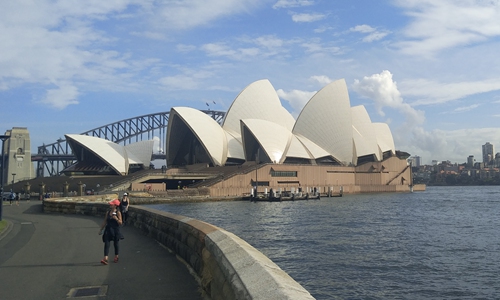HOME >> OPINION
Smaller states bleed as giants fight on trade
By Mark Beeson Source:Global Times Published: 2020/1/23 12:07:36

Sydney Opera House. Photo: Deng Zijun/GT
Trade policy used to be the rather boring preserve of economic specialists. No longer so. Trade is now a crucial instrument of geoeconomic statecraft in which more than national prosperity is at stake. On the contrary, as the laboriously negotiated deal between the world's two biggest economies demonstrates, deal-making involves questions of national prestige and even geopolitics. In the absence of outright, old-fashioned conflict, economic competition is where major international rivalries and tensions play out these days.
Much attention has already been given to the implications of the phase one trade deal between the US and China, and trying to decipher who - if anyone - came out on top and what the long-term implications might be for the world's most consequential economic relationship. Understandably enough, less attention has been paid to the impact the deal may have on other parts of the world. No country illustrates more clearly the difficulties faced by the world's smaller players than Australia.
China is Australia's largest trade partner and there is little doubt that the prosperity of the Australians is highly dependent on what happens in China. This is something of an awkward economic and political reality at the best of times, but the potential contradictions and tensions in the bilateral relationship are thrown into sharp relief when China finds itself locked in a major trade war with Australia's principal security partner, the US.
Analysing the implications of potentially incompatible economic and strategic goals has become a growth industry in Australia, as it has in much of the region. Even before the recent trade dispute between China and the US escalated, it was a problem. Unfortunately, it is not likely that the signing of phase one trade deal is going to make life any easier or certain for the region's lesser lights.
The big problem with bilateral trade agreements, according to mainstream economics, is that they are inefficient and likely to divert trade. The US is still the largest economy in the world and this gives it major bargaining power and leverage in trade negotiations with even its largest rivals. Donald Trump is not the first American president to try to use this geoeconomic power to address allegedly "unfair" trade practices in East Asia, as America's close strategic ally Japan discovered in the 1980s.
Being a close strategic partner of the US is no guarantee of preferential treatment when America's perceived national economic interest is at stake. The Trump administration's unilateral decision to withdraw from the painstakingly negotiated Trans-Pacific Partnership was a major blow to both Australia and Japan, which had played prominent roles in bringing it to fruition.
Whatever the bilateral merits of the proposed agreement between China and the US and no matter how difficult it proves to follow through with the next instalment, it will do little to help Australia or any of the other smaller economies.
Significantly, some of the most important proposals in the bilateral deal are in the agricultural sector, still one of Australia's most important industries, the recent bushfires notwithstanding. Under the agreement, China will reduce barriers for products from the US, including meat, dairy and baby formula - which also happen to be key Australian exports to China.
While this policy may go some way to placating Trump supporters in America's conservative rural communities, it is likely to have a negative impact on their counterparts in Australia and elsewhere. It is precisely this sort of zero-sum trade diversion that mainstream economists object to, and why they argue that multilateral trade deals are always preferable for less powerful players.
It is not hard to see why. Countries like Australia have limited bargaining power at the best of times. When Australian political and strategic elites consider themselves to be reliant on the US to defend them from possible threats - i.e., China - it is even more difficult for them to champion the merits of a multilateral system that might otherwise protect them.
Australian foreign policymakers spend a lot of time advocating the merits of the so-called "rules-based international order," but they have little capacity to actually ensure its operation. The reality is that countries like Australia are rule-takers not rule-makers. At a time when the Trump administration is undermining the foundations of the international order it did so much to create and from which so many - including China - have benefitted, this is not a happy state of affairs.
Not many readers have heard of the "Cairns Group" of agricultural producers that promoted trade liberalization in the early 1990s, but it demonstrated that so-called middle powers could have an influence in international affairs when they cooperated to promote common interests. Australia played a major role in this innovative and effective grouping.
To avoid getting crushed when the great powers make deals that suit them rather than the international trading system as a whole, similar type of activism might be useful now. It would require genuinely independent policy thinking, however, something Australian policymakers are not currently famous for.
The author is a professor of international politics at the University of Western Australia. opinion@globaltimes.com.cn
Posted in: VIEWPOINT,ASIAN REVIEW